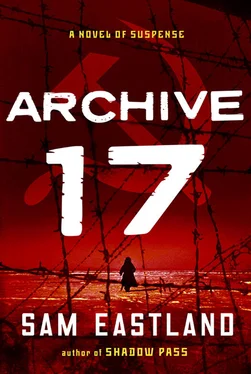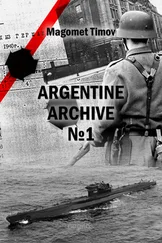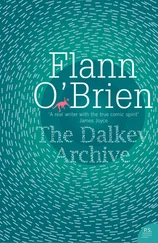Sam Eastland - Archive 17
Здесь есть возможность читать онлайн «Sam Eastland - Archive 17» весь текст электронной книги совершенно бесплатно (целиком полную версию без сокращений). В некоторых случаях можно слушать аудио, скачать через торрент в формате fb2 и присутствует краткое содержание. Жанр: Исторический детектив, на английском языке. Описание произведения, (предисловие) а так же отзывы посетителей доступны на портале библиотеки ЛибКат.
- Название:Archive 17
- Автор:
- Жанр:
- Год:неизвестен
- ISBN:нет данных
- Рейтинг книги:3 / 5. Голосов: 1
-
Избранное:Добавить в избранное
- Отзывы:
-
Ваша оценка:
- 60
- 1
- 2
- 3
- 4
- 5
Archive 17: краткое содержание, описание и аннотация
Предлагаем к чтению аннотацию, описание, краткое содержание или предисловие (зависит от того, что написал сам автор книги «Archive 17»). Если вы не нашли необходимую информацию о книге — напишите в комментариях, мы постараемся отыскать её.
Archive 17 — читать онлайн бесплатно полную книгу (весь текст) целиком
Ниже представлен текст книги, разбитый по страницам. Система сохранения места последней прочитанной страницы, позволяет с удобством читать онлайн бесплатно книгу «Archive 17», без необходимости каждый раз заново искать на чём Вы остановились. Поставьте закладку, и сможете в любой момент перейти на страницу, на которой закончили чтение.
Интервал:
Закладка:
“Even if I did want the job, did you ever stop to think that Klenovkin could never hand it to a prisoner? Dalstroy wouldn’t let him. The company would never trust a convict with their food.”
“I didn’t think of that.” Melekov raised his head sharply. “None of this was my idea.”
Pekkala threw the knife away across the floor. “Just get up!”
Gingerly, Melekov dabbed his fingers against his nostrils. “I think you broke my nose,” he muttered bitterly.
“Whose idea was this, Melekov?”
Reluctantly, the cook shook his head. “If I tell you …”
“Give me the name,” growled Pekkala.
“Gramotin,” he replied in a whisper.
Pekkala breathed out slowly. “Did he say why?”
Melekov shrugged. “It doesn’t matter. From now on, my life’s worth even less than yours, and yours wasn’t worth much to begin with.”
Pekkala realized that the time was fast approaching when he would either have to leave this camp or risk becoming the subject of his own murder investigation.
In the meantime, Ryabov’s death remained unsolved.
That thought sent a familiar shudder through his bones.
This was not the first time Pekkala had failed to close a case.
Pekkala and the Tsar stood on a balcony outside the Alexander Palace. It was an early-summer day, the sky powder blue and pollen lying luminous and green upon the puddles of a rainstorm from the night before .
“A man has been found dead,” said the Tsar. “He was a courier for the Turkish embassy.”
“Where was the body found?” asked Pekkala .
“It was pulled from the water just beneath a bridge over the Novokislaevsk River, north of Moscow .
“Their ambassador asked for you by name. Given the value of our relationship with that country, I could hardly refuse.”
“I will begin immediately.”
“Of course, but do not exhaust yourself with this inquiry.”
Pekkala glanced at the Tsar, trying to fathom the meaning of his words .
“What I am telling you,” Nicholas Romanov explained, “is that this is ultimately a matter for the Turks to unravel. It is not our job to oversee their diplomats. Look around, see what you can find, and then move on.”
Pekkala’s preliminary inspection of the body revealed no marks which would suggest a violent death. The dead man was fully clothed but did not appear to have drowned. Pekkala quickly ruled out suicide, since the drop would not have killed or even injured him .
Every day, during that first week of the investigation, Pekkala returned to the bridge and stood looking down into the water as he attempted to compose in his mind not only the reason for this man’s death but the questions which might lead him to the answer .
He stood among fishermen, who dangled bamboo poles above the water, smoked their pipes, and talked about the body. They had been the first to find it and barraged Pekkala with questions about the case .
But Pekkala had questions of his own. “Could the body have drifted here from somewhere upstream?” he asked .
“This is a lazy old river,” one of them replied. “Somebody threw him off the bridge. Where he fell is where he sank and where he sank is where we found him.”
“Do you fish here every day?”
“This time of year we do. Carp, pike, dace. They’re all down there in those weeds.”
“Then they knew you would find him. In fact, somebody wanted you to find him.”
“Unless,” suggested another fisherman, “they didn’t know the area and were just getting rid of the body.”
Pekkala shook his head. “This was done by a professional. The dead man is a message. But about what? And to whom?”
“That would be your job, Inspector,” said the fisherman .
After one week, without explanation, the Tsar called Pekkala off the case and did not assign a new investigator to take over .
Ever since, Pekkala had been haunted by his failure to arrest the killer. He felt an obligation to the victim, as if they’d formed a partnership between the living and the dead. Since that day, like stones in his pockets, he had carried the unanswered questions of that murder .
The next day Melekov showed up for work in the kitchen with a bandage on his face and two black eyes.
The two men did not speak about what had happened the day before.
Pekkala was just finishing his breakfast duties, when Tarnowski, Lavrenov, and Sedov barged into the kitchen.
Melekov, with a mound of fresh dough balanced in his hands, stood paralyzed with fear.
Tarnowski grabbed the cook and pushed him to his knees. The dough fell with a splat onto the floor.
At the same time Lavrenov produced a leather cord from his sleeve, looped it around Melekov’s neck, and began to strangle him.
Melekov’s face turned purple. His eyes bulged. Feebly, he clawed at the leather cord which had sunk into the soft flesh of his throat.
“Enough!” Pekkala shouted.
Lavrenov, his teeth bared with the effort of strangling Melekov, glanced first at Pekkala and then towards Tarnowski.
Tarnowski jerked his chin.
Lavrenov let go of the cord.
With a gasp, Melekov collapsed onto the floor.
“We weren’t going to kill him,” explained Sedov.
“Just teach him a lesson is all,” said Lavrenov.
Tarnowski went to Melekov and rolled the man over with his boot. “I told you to leave him alone.”
Melekov nodded weakly, his hands pressed to his throat.
“Now get out,” Tarnowski ordered the cook. “Come back in half an hour.”
Crawling on his hands and knees, Melekov departed from the kitchen.
“You didn’t need to do that,” Pekkala told them. “We had already made our peace.”
“With him, perhaps,” replied Tarnowski, “but what about the next one? And the one after that? Because, believe me, there will be more, which is why I have come here to make you an offer.”
“What kind of offer?”
“The chance to save your life.”
“How?”
“By getting out of here,” said Tarnowski.
“You mean escape? What makes you think I’d stand a better chance than anybody else who’s tried to leave this place?”
“Because we are coming with you,” replied Sedov.
Lavrenov nodded in agreement. “We have a plan. If it works, we’ll soon be living like kings.”
“That doesn’t sound like a plan,” answered Pekkala. “It sounds more like a fantasy.”
“It is indeed a fantasy,” Tarnowski agreed, “but one a man can bring to life with pockets filled with gold.”
“What gold?” demanded Pekkala.
“The last of the Imperial Reserves,” whispered Lavrenov.
Pekkala stared at the men with a look of pity on his face. “I am sorry to be the one to tell you this, but the Imperial Reserves are long gone. The Czechs handed them over to the Bolsheviks at Irkutsk, in exchange for being allowed to pass through the Lake Baikal tunnels, which the Reds would have destroyed otherwise. By the time this occurred, you were already in prison. Perhaps nobody ever told you-”
“We know about the Czechs,” Sedov interrupted. “We know how they betrayed us and that they gave everything they had to the Bolsheviks.”
“The thing is,” said Lavrenov, “they didn’t have it all.”
“That is a secret we have kept for many years,” Tarnowski said, “but the time has come for you to know the truth.”
“Colonel Kolchak had told us that the safest place for the gold was in the hands of his uncle, Admiral Alexander Kolchak, who had gathered together an army of anti-Bolshevik forces,” Sedov told Pekkala. “Getting to them meant crossing the entire length of Russia, but if we could do it, not only would the gold be safe but we would also be out of danger. You see, we made that journey as much for ourselves as for the Tsar. By the time we reached the city of Kazan, we had crossed almost half the country, but the Red Cavalry was catching up with us. We knew we’d never make it if we tried to hold on to the gold.”
Читать дальшеИнтервал:
Закладка:
Похожие книги на «Archive 17»
Представляем Вашему вниманию похожие книги на «Archive 17» списком для выбора. Мы отобрали схожую по названию и смыслу литературу в надежде предоставить читателям больше вариантов отыскать новые, интересные, ещё непрочитанные произведения.
Обсуждение, отзывы о книге «Archive 17» и просто собственные мнения читателей. Оставьте ваши комментарии, напишите, что Вы думаете о произведении, его смысле или главных героях. Укажите что конкретно понравилось, а что нет, и почему Вы так считаете.











